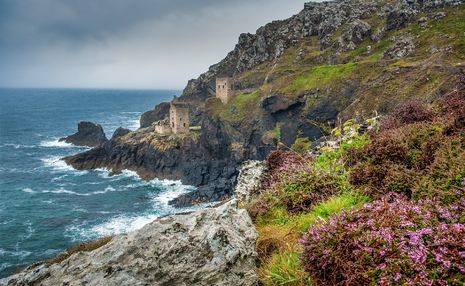Enys Men: A perfectly unsettling Cornish folk-horror
“This is a love letter to a version of Cornwall that no longer exists,” writes Luke Morris about Mark Jenkin’s Enys Men

Enys Men, Mark Jenkin’s follow-up to the BAFTA winning Bait, asks more questions than it can answer. Warping our relationship with time and environment, Jenkin shows us how culture and history seep into the surroundings that we take for granted.
It would be easy to call Enys Men a folk-horror, but in reality it’s not quite “folk” or “horror”. Instead, elements of both genres are morphed into a disquieting portrait of loneliness that establishes a fundamental link between nature and ourselves. Jenkin thinks of his film “as a ghost story,” and I suppose that’s right too. At its core, this is a love letter to a version of Cornwall that no longer exists. The sensory allure of the film’s isolated island setting with its withered, brown landscape and rich history is felt not only by Mary Woodvine’s solitary wildlife volunteer but by us as well.
Cornish for “stone island”, the feature follows this lonely volunteer investigate a rare wildflower poised on a cliff edge. Her routine, mundane and almost ritualistic, grounds the film. We accompany her daily morning walk through a colourless landscape that’s occasionally interrupted by pockets of yellow and passing an abandoned mineshaft and church ruins — remnants of a long-forgotten community. Descending to the cliff edge, she inspects her flowers and plunges a thermometer into the ground, before returning home to note down her findings:
21 April 1973. 14.4°C. Observations: no change.
“Jenkin knows how to get under your skin”
Watching this routine repeat for days on end with seemingly no resolution in sight shouldn’t be captivating. But, somehow, because there’s an intentionality to everything on screen, it is. The director’s use of clockwork cameras and hand-processed 16mm film stock is distinctive, introducing an earthy grain and bursts of distortion that occasionally plague the screen with unnatural pigments. The vast ocean surrounding the island is treated with visual reverence, recognised in the same frame as both a lifeline and a place of tremendous danger and loss. While these intimate images pull us in, Jenkin’s signature post-sync audio and eerie, vacuum-like score distances us once again.
In a film characterised by scarcity, we become hypersensitive to every little detail. Time and again, moments of horror are amplified because of what comes before them: absolutely nothing. Jenkin knows how to get under your skin. It’s these fleeting moments of pure observation that have the most impact. We’re asked to piece together fragments of two lives — both of the individual and the island she inhabits — in a constantly shifting landscape where death is never final. Often, everything we need to know is etched on Woodvine’s face.
“Often, everything we need to know is etched on Woodvine’s face”
Only at its halfway point does Enys Men truly reveal itself, taking on an entirely different identity as the volunteer’s seclusion is slowly broken by visions and supernatural disturbances. When lichen begin to grow on the wildflowers, they appear on her own body too. Time is warped as past, present and future collide. History folds in on itself; Jenkin uses apparitions of Cornish culture — lost miners and lifeboats, the desecration of standing stones and religious sites, and the slow severing of our relationship with nature through tourism — to bring us back to a time where the world was unspoiled, without passing comment on any of it.
That’s why the longer I think about the film, the more I find myself reinventing its meaning. In the absence of objectivity, there is something universal here. A rare connection is forged between this red coat-clad wildlife volunteer and us. And yet, despite all the questions that remain, there is one idea that Jenkin puts forward quite clearly: if we neglect and discard our relationships with the natural environment, culture and history will be forever lost. By reconnecting with the landscape, as this lone woman does, we can reclaim elements of a forgotten and collapsed culture. Enys Men is haunting, hypnotic and profound — it doesn’t get much better than this.
 News / University Council rescinds University Centre membership20 February 2026
News / University Council rescinds University Centre membership20 February 2026 News / Hundreds of Cambridge academics demand vote on fate of vet course20 February 2026
News / Hundreds of Cambridge academics demand vote on fate of vet course20 February 2026 News / Judge Business School advisor resigns over Epstein and Andrew links18 February 2026
News / Judge Business School advisor resigns over Epstein and Andrew links18 February 2026 News / Caius students fail to pass Pride flag proposal20 February 2026
News / Caius students fail to pass Pride flag proposal20 February 2026 News / Union cancels event with Sri Lankan politician after Tamil societies express ‘profound outrage’20 February 2026
News / Union cancels event with Sri Lankan politician after Tamil societies express ‘profound outrage’20 February 2026










